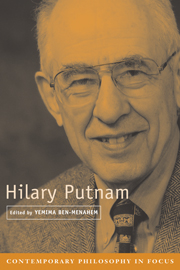Book contents
- Frontmatter
- Contents
- List of Contributors
- Acknowledgments
- 1 Introduction
- 2 Putnam's “The Meaning of ‘Meaning’”: Externalism in Historical Context
- 3 The Face of Perception
- 4 Realism, Beyond Miracles
- 5 Putnam on Skepticism
- 6 The Tale of Quantum Logic
- 7 Another Philosopher Looks at Quantum Mechanics, or What Quantum Theory Is Not
- 8 Structural Realism and Contextual Individuality
- 9 The Rise and Fall of Computational Functionalism
- 10 The Pragmatic Turn: The Entanglement of Fact and Value
- Index
- References
4 - Realism, Beyond Miracles
Published online by Cambridge University Press: 08 January 2010
- Frontmatter
- Contents
- List of Contributors
- Acknowledgments
- 1 Introduction
- 2 Putnam's “The Meaning of ‘Meaning’”: Externalism in Historical Context
- 3 The Face of Perception
- 4 Realism, Beyond Miracles
- 5 Putnam on Skepticism
- 6 The Tale of Quantum Logic
- 7 Another Philosopher Looks at Quantum Mechanics, or What Quantum Theory Is Not
- 8 Structural Realism and Contextual Individuality
- 9 The Rise and Fall of Computational Functionalism
- 10 The Pragmatic Turn: The Entanglement of Fact and Value
- Index
- References
Summary
Two things about Hilary Putnam have not changed throughout his career: some (including Putnam himself) have regarded him as a “realist” and some have seen him as a philosopher who changed his positions (certainly with respect to realism) almost continually. Apparently, what realism meant to him in the 1960s, in the late seventies and eighties, and in the nineties, respectively, are quite different things. Putnam indicates this by changing prefixes: scientific, metaphysical, internal, pragmatic, commonsense, but always realism. Encouraged by Putnam's own attempts to distinguish his views from one time to another, his work is often regarded as split between an early period of “metaphysical realism” (his characterization) and a later and still continuing period of “internal realism”. Late Putnam is understood to be a view that insists on the primacy of our practices, while the early period is taken to be a view from outside these, a “God's Eye view”. As Putnam himself stresses (1992b), this way of dividing his work obscures continuities, the most important of which is a continuing attempt to understand what is involved in judging practices of inquiry, like science, as being objectively correct. Thus Putnam's early and his current work appear to have more in common than the division between “early” and “late” suggests. In fact, Putnam's earlier writings owe much of their critical force to his adopting the pragmatic perspective of an open-minded participant in practices of empirical inquiry, a stance not explicitly articulated in these writings but rather taken simply as a matter of course.
- Type
- Chapter
- Information
- Hilary Putnam , pp. 83 - 124Publisher: Cambridge University PressPrint publication year: 2005
References
- 2
- Cited by



